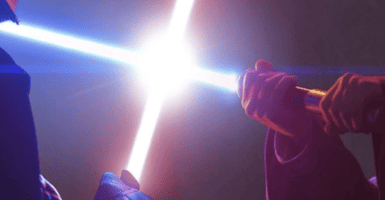Lab-Created Brain Cells Learn How To Play Pong In Just Five Minutes
Scientists have taught brain cells in a petri dish how to play Pong, and the experiment could change how humans live forever.
It’s either a small step for gamers, or a huge step towards creating Skynet-like artificial intelligence, but scientists in Australia have been able to teach brain cells that were grown in a lab petri dish how to play Pong. Using a “neural network system” of neurons and electrodes, these scientists have made the revolutionary step of fusing organic tissue with technology, that will allow for sensory output that could change the way we view thought, learning, and intelligence. These experiments have been going on for some time, and we’ve reported on it before, but this is the first time we have actually been able to see how these cells actually played a game of Pong, thanks to a new YouTube video and a report from Science Alert.
Watching a game of Pong being played may not be very exciting, but it is fascinating to consider that brain cells in a dish are controlling the action you see, and you can see the “Pong paddle” respond to the movement of the ball in order to return it. It wasn’t a perfect game, mind you, and they don’t seem to react as quickly as you or I would (or even a computer for that matter), but the implications of what can now be done are far-reaching, thanks to the work of scientists at Cortical Labs.
We’ve always thought about artificial intelligence (A.I.) as a purely silicon-based platform, as a program that operates on chips and boards, like the work at Boston Dynamics and their “robot dogs.” The introduction of neurons from brain cells (in this case, extracted from mice and humans) that could interact with an array of microelectrodes is revolutionary, especially since the human brain is capable of faster computations than even the best computer. The network of microelectrodes with organic neurons attached is called DishBrain, and using the video game Pong, scientists were able to “teach” the neurons to respond to stimuli (the moving ball) by sending impulses to the microelectrodes to move the paddle.
Cortical Lab scientists were able to tag various brain cells with different colors: neurons glow purple, axons glow red, and dendrites glow green. In just five minutes, they could see these cells “learn” to react to electric stimuli from microelectrodes on different sides of a petri dish, mirroring the movement of the ball. The brain cells reacted with signals to move the paddle to meet the ball, and an actual game of Pong was played.

The results could have a profound effect not just on artificial intelligence, but on how we medically treat the brain. “We have shown we can interact with living biological neurons in such a way that compels them to modify their activity, leading to something that resembles intelligence,” Cortical Labs neuroscientist Brett Kagan said. It’s an unprecedented step Kagan is explaining: using electric stimuli, the brain cells were able to adjust their sensory output, and as a result, learn to play the game of Pong better, and increase reaction time for better results.
Cortical Labs isn’t the only company fusing brain cell organics with technology. Elon Musk’s company Neuralink has been able to create chips that interact with the human brain, including inputting music and (believe it or not) allowing monkeys to play Pong. However. Cortical Labs’ work is based on the cellular level, while Musk’s company utilizes the brain as a whole, and is more focused on commercial applications so far.
By observing that brain cells will react to stimuli with improved reactions, medical doctors could use the method to see the effect drugs and other treatments have on the brain. It could revolutionize how we treat brain injuries, and we can thank Pong for showing us how.












